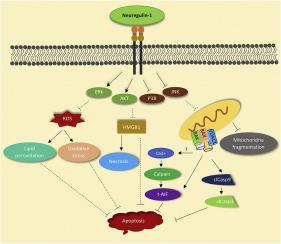Experimental Neurology ( IF 4.6 ) Pub Date : 2021-07-24 , DOI: 10.1016/j.expneurol.2021.113817 Narjes Shahsavani 1 , Arsalan Alizadeh 1 , Hardeep Kataria 1 , Soheila Karimi-Abdolrezaee 1

|
Spinal cord injury (SCI) causes sensorimotor and autonomic impairment that partly reflects extensive, permanent loss of neurons at the epicenter and penumbra of the injury. Strategies aimed at enhancing neuronal protection are critical to attenuate neurodegeneration and improve neurological recovery after SCI. In rat SCI, we previously uncovered that the tissue levels of neuregulin-1beta 1 (Nrg-1β1) are acutely and persistently downregulated in the injured spinal cord. Nrg-1β1 is well-known for its critical roles in the development, maintenance and physiology of neurons and glia in the developing and adult spinal cord. However, despite this pivotal role, Nrg-1β1 specific effects and mechanisms of action on neuronal injury remain largely unknown in SCI. In the present study, using a clinically-relevant model of compressive/contusive SCI in rats and an in vitro model of glutamate toxicity in primary neurons, we demonstrate Nrg-1β1 provides early neuroprotection through attenuation of reactive oxygen species, lipid peroxidation, necrosis and apoptosis in acute and subacute stages of SCI. Mechanistically, availability of Nrg-1β1 following glutamate challenge protects neurons from caspase-dependent and independent cell death that is mediated by modulation of mitochondria associated apoptotic cascades and MAP kinase and AKT signaling pathways. Altogether, our work provides novel insights into the role and mechanisms of Nrg-1β1 in neuronal injury after SCI and introduces its potential as a new neuroprotective target for this debilitating neurological condition.
中文翻译:

neuregulin-1beta1 的可用性通过半胱天冬酶依赖性和独立机制保护脊髓损伤中的神经元和免受谷氨酸毒性
脊髓损伤 (SCI) 会导致感觉运动和自主神经损伤,这部分反映了损伤中心和半暗带神经元的广泛、永久性损失。旨在增强神经元保护的策略对于减轻神经变性和改善 SCI 后的神经恢复至关重要。在大鼠 SCI 中,我们之前发现神经调节蛋白-1β1(Nrg-1β1)的组织水平在受伤的脊髓中急剧且持续地下调。Nrg-1β1 因其在发育中和成人脊髓中神经元和神经胶质的发育、维持和生理学中的关键作用而闻名。然而,尽管有这一关键作用,Nrg-1β1 对神经元损伤的特异性作用和作用机制在 SCI 中仍然很大程度上未知。在目前的研究中,在原代神经元中谷氨酸毒性的体外模型中,我们证明 Nrg-1β1 通过在 SCI 的急性和亚急性阶段减弱活性氧、脂质过氧化、坏死和细胞凋亡来提供早期神经保护。从机制上讲,谷氨酸激发后 Nrg-1β1 的可用性保护神经元免受半胱天冬酶依赖性和独立细胞死亡的影响,这种死亡是由调节线粒体相关的凋亡级联和 MAP 激酶和 AKT 信号通路介导的。总之,我们的工作为 Nrg-1β1 在 SCI 后神经元损伤中的作用和机制提供了新的见解,并介绍了其作为这种使人衰弱的神经系统疾病的新神经保护靶点的潜力。











































 京公网安备 11010802027423号
京公网安备 11010802027423号